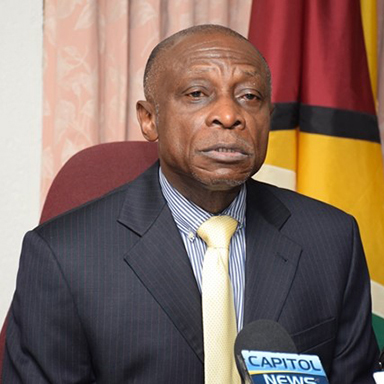While saying he would not be contesting for the leadership of the People’s National Congress Reform (PNCR) at its Biennial Delegates’ Congress today due to concerns about the process, former Foreign Affairs Minister Carl Greenidge yesterday made a call for the party’s executive to allow its membership to help fashion the way forward no matter the outcome of the voting.
“Such an approach is imperative, if the PNCR is to overcome the chains, real and imagined, by which it is currently shackled,” Greenidge said in a statement released last night.
The party will today vote for a leader to replace the incumbent, former president David Granger, who did not receive a nomination for re-election. Those contesting for the post are Aubrey Norton, Joseph Harmon, and Dr Richard Van West-Charles.
Greenidge, who was also nominated, confirmed via the statement that due to his concerns he had indicated that it would be inappropriate for him to accept the nominations for the post of leader and member of the Central Executive Committee (CEC).
Having previously voiced concerns about the path on which the party seemed to have embarked and a crisis in its leadership, Greenidge noted that while a Congress, the party’s highest decision-making forum, would normally involve an exhaustive examination of relevant issues affecting the membership and the country, the CEC only managed to organise the forum only to change the leadership. “There is to be no analysis, no debates about the political situation and no report on the 2020 national elections, its outcome and no policy pronouncements. It is only about the changing of the guard. Ironically, such a Congress should be quite consistent with the approach of the leadership of Mr Granger – no Party reforms, no resolutions, no or minimal debates etc,” he said, before also observing that the PNCR as a party has paid the price for failure to insist on the conduct of transparent and careful review of its performance in general and national elections.
According to Greenidge, even taking account of the decision of the CEC to postpone the elections to today in order to address “some obvious weaknesses, too many questions still remain unaddressed.” “Those areas are of concern to me because I have had first-hand experience of the abuse of the Party’s election process. Many elements which generated concerns in 2011 and subsequently, are still in place,” he pointed out.
Greenidge said in recent times, beginning with contest for the PNCR Presidential Candidate in 2011, internal party elections have been hijacked by the Party apparatus on behalf of the Party Leader. “I need only mention a recount of ballots when there had been no declaration in the first place. In any case the counting was such that the margin of error between the votes counted before the cameras and that which followed a break (to conduct ‘a raffle’, which left ballots unprotected), was statistically improbable.”
He also highlighted the absence of elections to identify a Presidential Candidate for last year’s general elections and to select the Leader of the List. “Critical national representation such as the selection of the Party’s entire Parliamentary membership has been treated as being in the gift of the Leader of the Party. The rules endow him with such powers and the Party cannot be convincingly led by a person who believes that he is too greatly loved or too proud to face an election. The function of a leader is not to behave as though it is seditious for another Party member to run for positions for which the Party Constitution deems that members are to be elected,” he further noted.
Greenidge suggests that this situation has resulted in widespread dissatisfaction over the quality of representation of the constituency and the absence of a clear and authoritative PNCR voice at times when leadership and principled stands were needed to confront grievous political policies and serious challenges on the electoral front. “No viable and persuasive political Party can hold on to its constituency if its leadership is too timid to speak out against wrongs or to stand up for and hold positions which though morally correct are unpopular,” he said.
Greenidge also mentioned that he was informed that Granger less than a week ago informed the party Chairman, Volda Lawrence, of his impending departure from the country. (He will not be present for the Congress as he is in Cuba for health reasons.) While saying there should always be allowance for possible illness of the leader, Greenidge added that it is difficult to find another example of situation involving no transparent arrangements for handover of instruments and finances or of succession. As a result, he suggested that the CEC, which has been critical of the Leader and called for the Congress, seems to have been treated with “utter contempt” for “its impertinence.”
“Given these circumstances and whatever the outcome of tomorrow’s event, I urge that the CEC make arrangements to afford the general membership of the Party the opportunity to consider and help fashion the Party’s path ahead and to permit leaders and potential leaders to also contribute to those deliberations,” Greenidge said.
He also said he would continue to engage with members as appropriate and assured those who continue to appreciate his efforts to advance “the condition of our constituency” that he will continue to be available to encourage and support them in order to enhance their capacities and their groups’ development.






